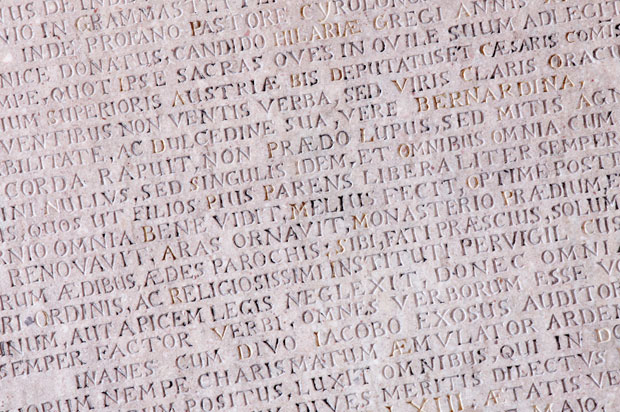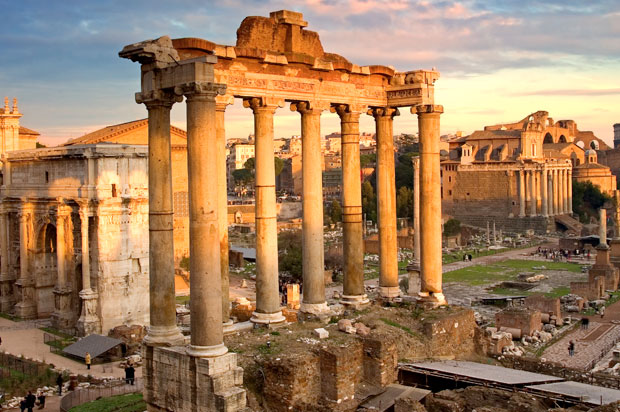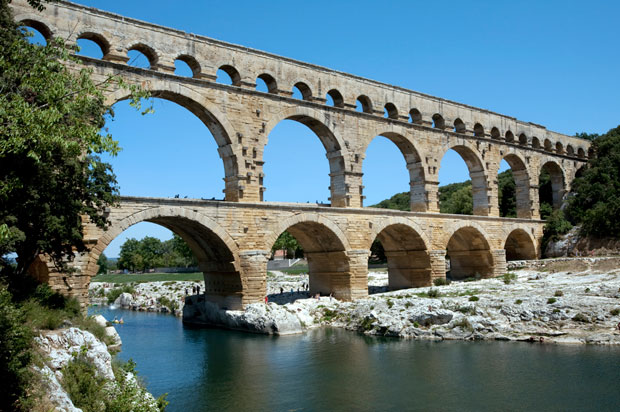(单词翻译:单击)
3.Newspapers
3.报刊雏形
The Romans were known to contribute to public discourse through the use of official texts detailing military, legal and civil issues. Known as Acta Diurna, or "daily acts," these early newspapers were written on metal or stone and then posted in heavily trafficked areas like the Roman Forum. Acta are believed to have first appeared around 131 B.C. and typically included details of Roman military victories, lists of games and gladiatorial bouts, birth and death notices and even human interest stories. There was also an Acta Senatus, which detailed the proceedings of the Roman senate. These were traditionally withheld from public view until 59 B.C., when Julius Caesar ordered their publication as part of the many populist reforms he instituted during his first consulship.
古罗马会发布《罗马公报》(或称《每日纪闻》),里面会涉及到处理军事、法律和民事的问题,让民众通过文章了解这些事项的结果;这些内容,会写在金属或刻在石头上,放在诸如古罗马广场这样的闹市区,供民众浏览,这便是报纸雏形。据考证,《罗马公报》最早出现于公元前131年,设及内容相当广泛,包括罗马军事捷报、比赛事项、格斗回合场次、出生喜讯和讣告等,甚至还会写些民众喜欢的故事。此外还有《元老院记事录》,用来记录罗马元老院会议的讨论和决议,虽然也算报纸雏形,但其内容保密,禁止公诸于众。直到公元前59年,古罗马执政官尤列乌斯·凯撒(Julius Caesar)在第一任期内实行民主改革,下令公布元老院及公民大会的议事记录,这些内容才得以流传开来。

2.Concrete
2.混凝土

Many ancient Roman structures like the Pantheon, the Colosseum and the Roman Forum are still standing today thanks to the development of Roman cement and concrete. The Romans first began building with concrete over 2,100 years ago and used it throughout the Mediterranean basin in everything from aqueducts and buildings to bridges and monuments. Roman concrete was considerably weaker than its modern counterpart, but it has proved remarkably durable thanks to its unique recipe, which used slaked lime and a volcanic ash known as pozzolana to create a sticky paste. Combined with volcanic rocks called tuff, this ancient cement formed a concrete that could effectively endure chemical decay. Pozzolana helped Roman concrete set quickly even when submerged in seawater, enabling the construction of elaborate baths, piers and harbors.
罗马混凝土的出现使得许多古罗马建筑,诸如万神庙、斗兽场、古罗马广场屹立至今。罗马人首次利用混凝土建造房屋大约源于2100年前,那时,混凝土被广泛应用于地中海地区所有的建筑中,包括引水渠、桥梁以及纪念碑等等。罗马混凝土在强度上远不如现代混凝土,但罗马混凝土独特的成分使其更加持久耐用。罗马混凝土是罗马人利用熟石灰和一种在维苏威火山地区发现的粉尘物(Pozzolana)与水混合制成的具有高粘性的糊状物。加入了火山凝灰岩的罗马混凝土具有超强的抗化学腐蚀性,而维苏威火山地区的粉尘物(Pozzolana)使得罗马混凝土即使在海水中也能够迅速凝结硬化,得益于此,罗马人精心建造了浴场、码头和港口。
1.Aqueducts
1.引水渠

The Romans enjoyed many amenities for their day, including public toilets, underground sewage systems, fountains and ornate public baths. None of these aquatic innovations would have been possible without the Roman aqueduct. First developed around 312 B.C., these engineering marvels used gravity to transport water along stone, lead and concrete pipelines and into city centers. Aqueducts liberated Roman cities from a reliance on nearby water supplies and proved priceless in promoting public health and sanitation. While the Romans did not invent the aqueduct—primitive canals for irrigation and water transport existed earlier in Egypt, Assyria and Babylon—they used their mastery of civil engineering to perfect the process. Hundreds of aqueducts eventually sprang up throughout the empire, some of which transported water as far as 60 miles. Perhaps most impressive of all, Roman aqueducts were so well built that some are still in use to this day. Rome's famous Trevi Fountain, for instance, is supplied by a restored version of the Aqua Virgo, one of ancient Rome's 11 aqueducts.
古罗马拥有大量的公共设施,诸如公厕、地下排污系统,喷泉和公共浴池等等,大大方便了罗马人的生活。但是如果没有罗马引水渠的发明,一切与水有关的创新设施都将无法实现。第一条引水渠建造于公元前312年,在重力作用下,以石管、铅管和陶管作为输水管道把水引入城区。引水渠解决了罗马城的用水问题,对城市公共健康和卫生设施的发展也发挥了极其重要的作用。在引水渠出现之前,埃及、巴比伦和亚述人用原始运河引水灌溉,而罗马人则利用土木工程技术对运河进行改进,从而发明了引水渠。罗马帝国时期,数百条引水渠遍布整个帝国,其中一些水渠甚至长达60英里。水渠的伟大之处在于其历经千年岿然不动,时至今日,部分水渠仍在发挥作用,令人叹为观止。罗马著名的特莱维喷泉(Trevi Fountain)正是位于古罗马十一条大型水渠之一的维戈水渠(Aqua Virgo)的水源所在地。
审校:省略珺 编辑:橘子


